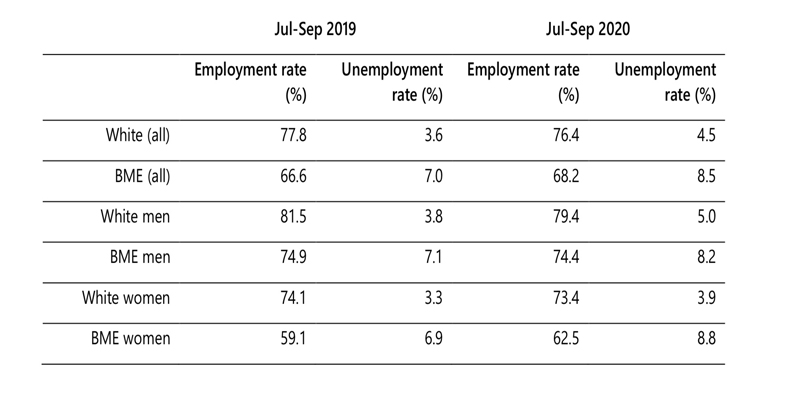The UK’s Trade Union Congress (TUC) has urged the Government to carry out a review into racism at work, after its latest analysis revealed that Black and Minority Ethnic (BME) employees have suffered the most job losses amid the pandemic.
BME staff lost jobs 26 times more than white workers, according to TUC’s analysis, and it’s on course to get worse. The study reveals that the number of BME workers fell by 5.3%; compared with a 0.2% fall among White workers up to September 2020 during the Covid-19 pandemic. As a result, 8.5% of BME workers (one in 12) are now unemployed according to the TUC’s analysis. The analysis is based on labour market data produced by the Office of National Statistics. In comparison, 4.5% of white workers (one in 22), are currently out of work.
JOB LOSSES BY INDUSTRY
“BME workers have borne the brunt of the economic impact of this pandemic,” according to Frances O’Grady, the TUC’s Secretary-General. “In every industry where jobs have gone, BME people have been more likely to be made unemployed.”
Jobs in travel, hospitality and retail are the hardest hit by Covid-19. Despite government support through furlough schemes to ease job losses, around 819,200 people in the UK still lost their jobs. The losses are mainly concentrated in the sectors affected by lockdown; with three industries accounting for 70% of job losses. They include accommodation and food (297,000), wholesale and retail (160,000) and manufacturing (115,000).

BME staff in these sectors have been disproportionately affected, noted TUC’s analysis. The number of staff from ethnic backgrounds employed in the food/accommodation industries, for example, fell by 23%; compared to just 13% for White workers. BME job losses in retail, however, accounted for 16%, compared to just 1% of White staff.
TACKLING SYSTEMIC RACISM & INEQUALITY
The pandemic has “held up a mirror to discrimination”, according to O’Grady. And she is calling on the UK Government for measures to end systemic racism and inequality. “The time for excuses and delays is over,” she remarked.
Beth Farhat, Northern TUC’s Regional Secretary, believes the situation “paints a picture of a worsening economy where BME workers have borne the brunt of the economic fallout”. “In every industry where jobs have gone, BME people have been more likely to be made unemployed. What we know is that when BME workers have held on to their jobs, they are more likely to be working in low-paid, insecure jobs that put them at greater risk from the virus,” says Farhat.

“We are also calling for urgent action to protect BME workers by introducing mandatory ethnicity pay gap reporting to make employers publish action plans to ensure fair treatment for BME workers in the workplace,” adds Farhat.
SUPPORT FOR FAIRNESS
The TUC is also calling for a ban on zero-hour contracts and strengthen the rights of insecure workers. Additionally, “the Government has got to publish all the equality impact assessments related to its response to Covid-19; and be fully transparent about how it considers BME communities in its policy decisions. To build the kind of society that most people in this region want, I think it must be built around good jobs and fairness. To do that everyone must be on an equal playing field when it comes to labour standards and pay”, she adds.
The TUC wants the Government to “step up efforts to stop unemployment, which has a disproportionate impact on BME workers”. This includes providing more support for struggling industries, as well as creating new jobs by investing in jobs in green infrastructure, transport and public services.
The Government must also improve the social safety net for those who do lose their jobs, said the TUC. This requires an urgent overhaul of the benefits system, which must include raising the basic level of Universal Credit and legacy benefits to at least 80% of the national living wage (£260 per week) and scrapping the five-week wait for first Universal Credit payment. Given the importance of measuring the impact of the pandemic on existing labour market inequalities, it would also like to see labour market data by ethnicity included in the ONS’s monthly labour market release, rather than as a separate quarterly release.

SCHEMES TO SAVE JOBS
Additionally, the TUC has urged the Government and Chancellor to extend the job retention scheme to save jobs. The latest employment figures released this week (26 January 2021) show unemployment rising to 5% in the three months to November 2020. The two largest rises in unemployment in 2020 occurred during the months when support was reduced or expected to end. In July 2020, when the initial job retention scheme ended and a modified scheme reduced levels of support, unemployment rose by 17%. And in October 2020, when the job retention scheme was due to fully end on 31 October, and an extension into 2021 not announced until 5 November, unemployment rose by 8%.
The TUC said that the Government must recognise the “damage done by withdrawing support too soon”; or by failing to guarantee continuation of support until the eleventh hour. “The more people we keep in work, the faster we can recover. But with the job retention scheme set to end in April, millions of people’s jobs hang in the balance,” added O’Grady. “When the Government planned to withdraw support last autumn, despite restrictions still being in place, unemployment surged. We can’t let that happen again. It’s time to end the uncertainty and anxiety. The Chancellor must urgently extend furlough support to the end of the year to keep jobs safe.”
For more information on the TUC’s Jobs and Recovery Monitor – BME Workers, click here.
The UK’s very first Race Equality Week takes place between 1st and 7th February 2021. Click here to read more.





































